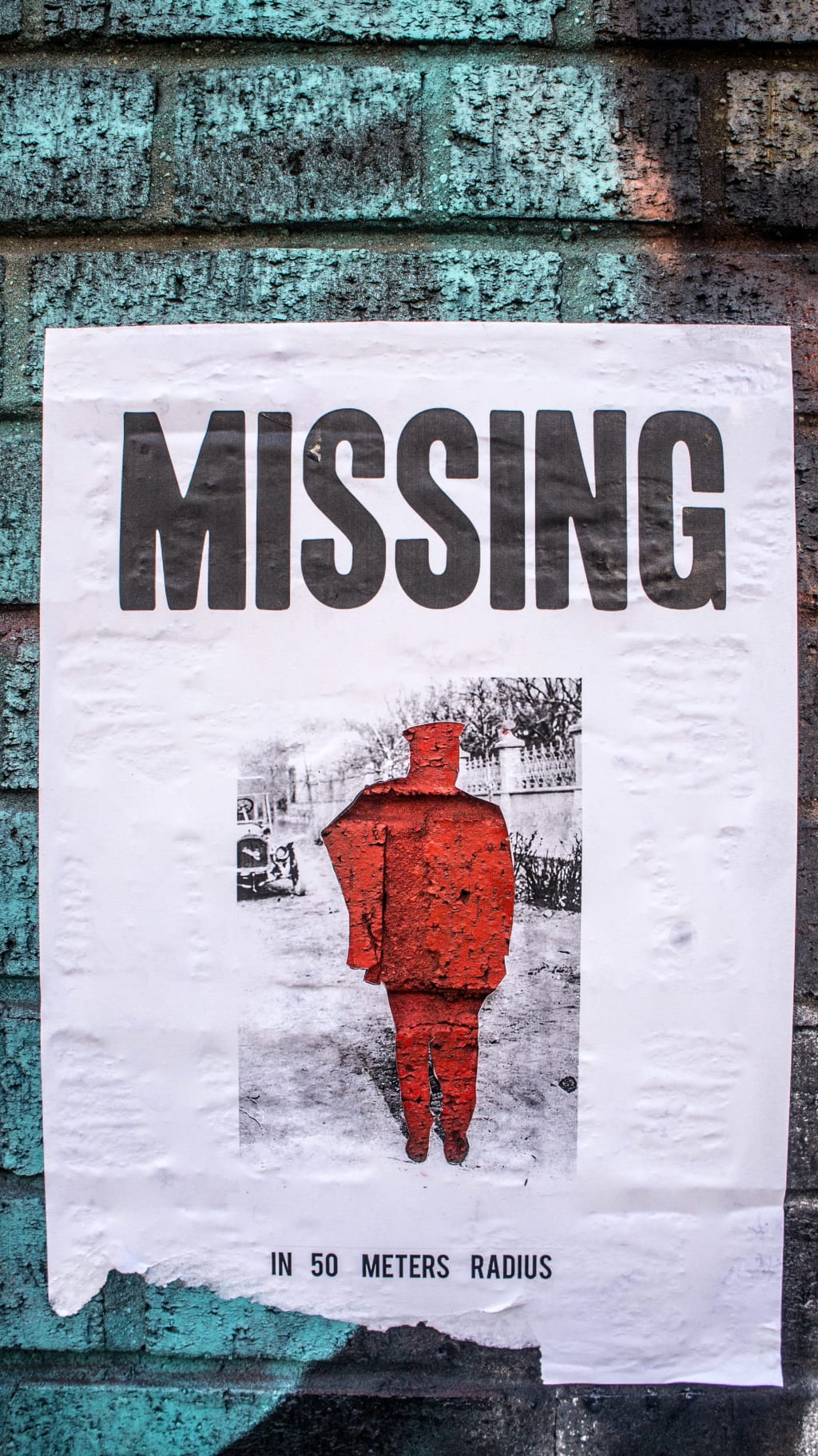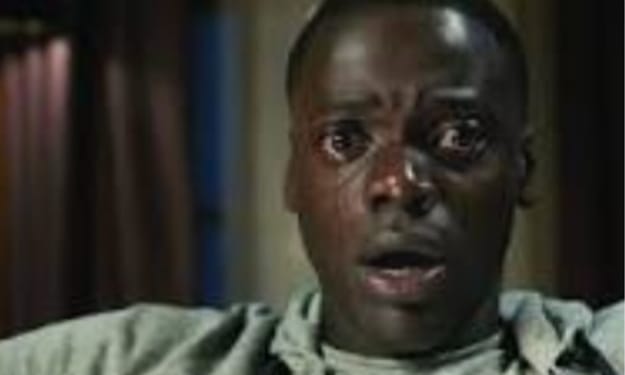
Three months after her disappearance, Cassandena walked back. One morning, a commuter driving into town on a state highway saw a girl, nearly naked, walking along the cobbled shoulder of the road. The girl appeared to be wearing only a loin cloth, black gloves and black shoes. She appeared to have a bib or a large black handkerchief wrapped around her neck, which fell down to cover her breasts. By the time the driver turned the car back around and called the police, the sun was bright enough to make it clear that the girl was actually naked.
Her shoes, gloves, loincloth and bib were all just dried blood, a thick layer of dried blood, black, swarming with buzzing black flies. Those flies bite on her body, as much as black fur.
The girl's head shaved, scabies, leaving only a stray lock of hair sticking out from behind her ear, or around her bald head.
She was badly behaved because she had two toes cut off her right foot.
That bib, that layer of blood on her chest, that layer of flies, found carved into the skin of her breasts with tic-tac-toe chess after being cleaned by a doctor in the hospital emergency room with alcohol, was won by an unknown person.
When they got her hands clean, they found that the little fingers of both hands were missing. The nails of the other fingers had been removed, leaving swollen and purplish flesh.
Underneath the layer of dried blood, her skin was greenish white. The girl's head resembled some bones in her jaw, with only her cheekbones and nasal bridge visible, and both temples above her jaw were sunken deep into two black holes.
In the compartment in the emergency room pulled up with a screen, Mrs. Clark leaned her body over the chrome steel rails of her daughter's bed and said, "Baby, oh my good baby ...... who did this to you?"
Cassandena let out a laugh and looked at the needle stuck in her arm, the clear plastic tube leading into her vein, and she said, "It was the doctor."
No, said Mrs. Clark, who cut her finger?
Cassandena looked at her mother and said, "Do you think I would let someone do that to me?" Her laughter stopped and she said, "I did it to myself." And that was the last time Cassandena let out a laugh.
Mrs. Clark said that the police found a piece of evidence where they found wood shavings as fine as needles pricked in her vagina, and in the lining of her anus. The police forensic team invited out shards of broken glass in the wounds on her chest and arms. Mrs. Clark told her daughter she couldn't keep quiet.
They needed to know all the loose ends that Cassandena could remember.
The police say that whoever did this is bound to kidnap another victim. Unless Cassandra could face her fears and help the police, her attacker would never be caught.
Cassandena sat on her bed in the sunlight coming in by the window, with several pillows padded behind her, watching the birds flitting back and forth in the blue sky.
Her fingers were wrapped in a large white bandage, her chest was covered with bandages, and she held a pencil in her hand to draw only the birds flying around, a sketchbook stand leaning against her knees.
Mrs. Clark said, "Cassandra? Baby? You need to tell the police everything."
If it helps, a hypnotherapist can be brought to the hospital. Social workers also bring fully detailed dolls to use in interviews.
Cassandena just looked at the birds and drew them.
Mrs. Clark said, "Cassandena?" She put her hand over Cassandena's white gauze covered hand.
Cassandena looked at her mother and said, "It won't happen again." Cassandena turned back to the birds of prey and said, "At least it won't happen to me again ......"
She said, "I'm a victim of my own."
Outside in the parking lot, the station's news crew set up satellite relay equipment, each OB van topped with a dish antenna, ready to deliver the news to the anchors in the studio. Reporters on the scene held microphones in their hands and plugged wireless headsets into their ears.
For three months, the town where they live has nailed posters to telephone poles. Each poster had a picture of Cassandra Clark: wearing a cheerleader's uniform and rocking blonde hair. For three months, police questioned students at that high school. Detectives questioned people who worked at bus stops, train stations and airports. Local television and radio stations aired public service announcements stating that she weighed 110 pounds, was five feet six inches tall, had green glasses and shoulder-length hair.
Search and rescue dogs sniffed the skirt of her cheerleader uniform and tracked the scent to a waiting chair at a bus stop.
Militia troops in motorized boats salvaged all the ponds, lakes and rivers within a day's drive.
Psychics called to say the girl was safe and sound. That she had eloped and married someone, or that she was dead and buried. Or that she had been sold as a white slave and smuggled to a foreign country to live in the harem of some oil baron. Or that she had undergone a sex change operation and would soon come home as a man. Or that the girl gave trapped in an old castle or some palace, locked up with a bunch of strangers, all of whom were hurting themselves. One psychic wrote five words on a piece of paper and sent it to Mrs. Clark, with trembling notes on the folded paper, written in pencil: Writer's Study Camp.
Three months later, all the yellow ribbons tied to the car antennas receded to nearly white. The flags of surrender.
No one paid any attention to the psychics; there were too many of those types of people.
Every unidentified body the police found, burned, decomposed or maimed beyond recognition, left Mrs. Clark breathless and relieved until it was determined, using teeth or DNA, that it was not Cassandra.
By the third month, Cassandra Clark was smiling and shaking her blonde hair on a milk carton (photos of missing persons are often printed on milk cartons in the United States. By that time, no one was lighting candles and praying for vigils, and the reward offered by the local bank became the only part of the case that would generate interest.
Then - by some miracle - she was walking naked beside the highway.
On her hospital bed hill, her skin was covered with purple bruises. Her hair was shaved. Plastic rings were worn around her wrists that read, "C. Clark."
The county's medical examiner wanted to take cells from male genitalia on her - the kind of cells he said were long and not the same as the round cells from the female pubic area. They wanted to take semen from her. The group of detectives used a vacuum suction to look for epidermal cells on her scalp, hands and feet that were not her own, and they found fibers of blue velvet, red satin and black hairy sea. They examined the inside of her mouth and used a small dish to analyze the DNA.
The police psychiatrist came and sat at her bedside and said that it was important for Cassandena to tell all her pain, all her sorrows.
Crews from television companies and radio stations, reporters from newspapers and magazines, sat in the parking lot, filming their stories with the windows of her hospital room as a backdrop, some backing up to film camera crews filming camera crews filming the windows of her hospital room. to show that the place had become a circus, as if that was the final truth.
When the nurse brought sleeping pills, Cassandre shook her head and said no. As soon as she closed her eyes, she fell asleep.
Because Cassandra wouldn't talk, the police approached Mrs. Clark and told her how much taxpayer money was being spent on their investigation. The detectives shook their heads and said how angry they were, how betrayed they felt, how they had worked so hard and cared so much for that girl and she cared nothing about the pain and trouble she was causing her family, society and government. She was afraid that everyone would cry for her and pray for her, everyone hated the monster that tortured her, and all of them wanted that person arrested and put on trial. They had worked hard to detect and exhausted themselves, and it was time to at least have that result. It was time for them to see her on the witness stand, crying and talking about how the monster had cut her fingers, slashed her breasts, and stuck a wooden stick up her ass.
And all Cassandra did was look at the detectives standing in a line next to her bed. Every one of their faces, all their hatred and anger focused on her because she wouldn't give them another mark. A real demon, a devil they desperately needed.
The district attorney threatened to charge Cassandena with obstruction of justice.
Her mother, Mrs. Clark, was among the group of people who glared at her.
Cassandra smiled weakly and said to them, "Don't you understand? You are too obsessed with conflict." She said, "This is my happy ending." She looked back at the window, at the birds flying by. She said, "I feel so good."
She still lives in the hospital and wants a goldfish that she keeps in a tank. Then she leans back on her bed and watches the goldfish swim around in the tank. Painting the goldfish was like her mother watching a TV show every night.
When Mrs. Clark visited her for the last time, Cassandena took her eyes off the goldfish bowl for just a moment and said, "I don't look like you anymore." She said, "I don't need to brag about my pain ......"
After that, Tess Clark never went to see her again.





Comments
There are no comments for this story
Be the first to respond and start the conversation.